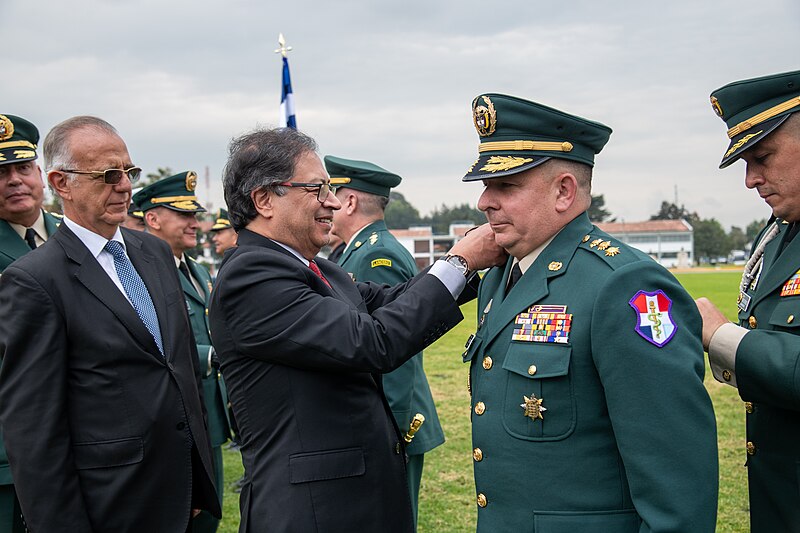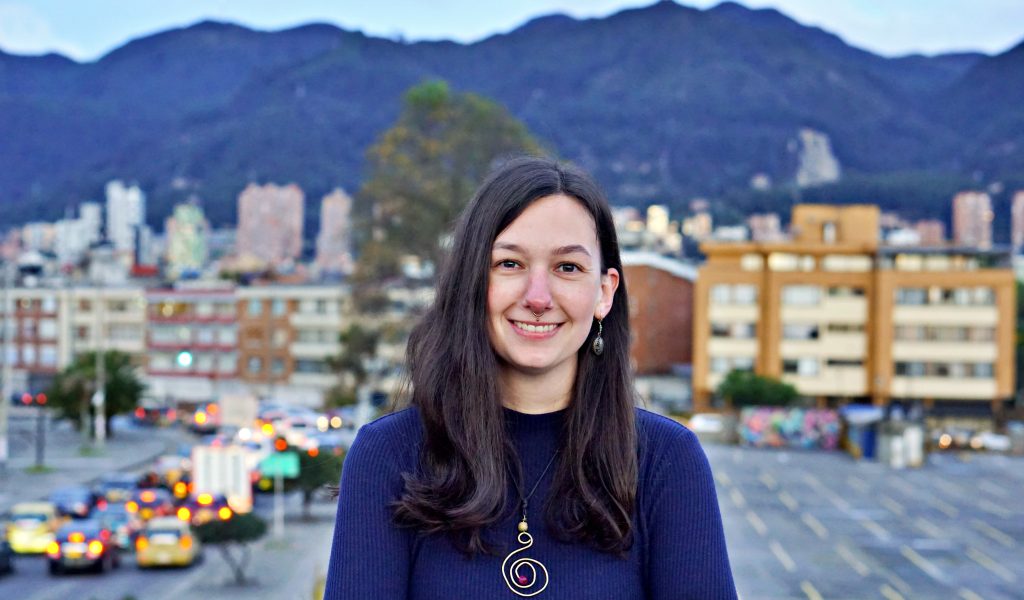Visionary or Dreamer? Colombia’s President Put to the Test
Colombia’s first progressive head of state, Gustavo Petro, is pursuing the ambitious goal of transforming his country into a “world power for life” and the “the planet’s breadbasket“. After more than two years in office, he can already point to some successes. At the same time, however, political and social headwinds are picking up – and many of his plans appear increasingly utopian.
Since Gustavo Petro took office in August 2022, Colombia has been the scene of a political experiment that is set to change the country in a profound way. As the first left-wing president in the history of conservative Colombia, Petro promised “change for life” in one of the countries with the most unequal income distribution in the world.
Since then, the 64-year-old has wanted to close the social gap with reforms to healthcare, pensions, employment and education. He also plans to establish a sustainable economic system that focuses on environmental protection rather than unbridled growth. At the heart of his program is “comprehensive peace”, which includes dialogue with all armed groups and far-reaching agricultural reform in order to pacify the war-torn country after more than five decades of conflict and transform it into a more open society.
A squeaky-clean start
Especially at the beginning of his term in office, Petro had some successes to show. This is also reflected in the latest observations of the Bertelsmann Transformation Index (BTI), in which Colombia has recently gained ground on indicators such as the “right of assembly” and the “separation of powers” under Petro. At the same time, various market indicators, such as “monetary stability” and the “banking system”, have stabilized at a high level.
The passing of a long overdue tax reform that favors the poor and taxes the rich and the oil industry more heavily is one of the most important developments under Petro. This reform was a central concern of the 2021 protests, when millions of people cried out for social justice. A similarly significant step is the comprehensive peace strategy “Paz Total”, which includes the (re)commencement of peace negotiations with illegal armed groups that have destabilized Colombia for decades. In addition, the peace treaty with the FARC guerrillas, which has been largely ignored since 2016, is being actively addressed.
At the same time, the agrarian reform initiated by Petro has already led to the handover of the first estates and is seen as an achievement of the country’s first left-wing government. In any case, Petro’s commitment to historically neglected groups has been particularly well received in rural areas. He advocates a new drug policy that does not unnecessarily criminalize the impoverished rural population, but instead promotes coffee and cocoa cultivation. The election of Francia Márquez, the first black vice president, underlines this minority thinking.
Under Petro, Colombia also joined the Escazú regional climate agreement, which aims to combine environmental protection and human rights. Under his leadership, the deforestation rate was reduced by almost 38% in 2023, which is a considerable success. In addition, forward-looking laws were passed, including the ban on single-use plastic and the taxation of sugar-heavy products to protect public health.
Colombia as a divided nation
These ambitious goals are set against the reality of a divided society. Petro’s supporters, the Petristas, are predominantly made up of historically disadvantaged groups such as the peasant, indigenous and Afro-Colombian population as well as urban progressives and the youth. In contrast, the old elites – including influential companies, large landowners and the political establishment – are increasingly raising their voices against the president because they see their economic interests at risk.
Petro speaks of “disinformation campaigns” by large media groups and a “coup” against him. However, the negative reporting seems to be having an effect: Current polls only give Petro approval ratings of 30 to 38 percent, compared to over 50 percent at the beginning of his term in office.
The resentment against Petro’s policies goes so far that several assassination plots against him have now been uncovered, as recently confirmed by the US ambassador Francisco Palmieri. In Colombia, land ownership is heavily concentrated in the hands of a small elite: One percent of the population owns 80 percent of the land, which further exacerbates social inequality. Much of the land that was originally intended for small farms has been illegally acquired by large landowners and multinational companies, sometimes with the help of paramilitary groups – as in the case of the world-famous banana company Chiquita. This has further exacerbated social inequality.
Old structures and a shaky peace process
Right-wing opposition members in Congress are also blocking Petro’s labor and healthcare reforms – and one of his greatest successes, his tax reform, has been overturned by the Constitutional Court. These events are interpreted by Petro’s supporters as a sign that the traditional elites are exerting increasing pressure on the country’s political institutions. They argue that the conservative majority in Congress and a judiciary dominated by the old guard are blocking change in order to preserve the status quo
While Petro is striving for far-reaching reforms, his government is facing a conservative judiciary and a majority opposition Congress, which are blocking many of his plans. Critics suspect that these institutions, partly influenced by traditional elites, are deliberately slowing down the reform process in order to secure the influence and privileges of the old power structures.
Petro faces massive institutional control and legal interference, which he describes as a “coup d’état, Colombian style”. In particular, he criticizes the fact that judges without jurisdiction are attempting to challenge his constitutional immunity as president – a move that, according to him, violates the constitution and democratic rules. Petro sees this as the work of conservative elites who want to weaken his left-wing government. The president and his supporters believe that an alliance of traditional media and the established powers that be has formed against him with the aim of concealing the achievements of President Gustavo Petro’s government and isolating him politically. These strategic coalitions use their power to control public perception and hinder the president’s ability to drive change.
While Petros and his circle of supporters speak of a right-wing conspiracy, political analysts are more cautious. They argue that the separation of powers in Colombia is fundamentally intact. However, Petros’ case also highlights a structural problem: partisan ties in the judiciary and administration often compromise the neutrality of these institutions and exacerbate political trench warfare. The tougher monitoring of Petro suggests that the traditional power structures see his reforms as a threat and are opposing him with all available means.
Although he presents himself as a charismatic reformer, Petro has not yet succeeded in uniting the country behind him. Conservative circles accuse him of being ideologically stubborn and refusing to make necessary economic compromises. The existing conflict of interest between Petro’s desire for social justice and the interest of the private sector is particularly evident in the pension reform, which is intended to break the dominance of private pension funds.
Meanwhile, Petro’s energy policy is also dividing opinion. The president is preaching a shift away from fossil fuels towards renewable energies within the next 17 years and is openly calling on the state oil company Ecopetrol to drive this transition process forward. However, these plans are met with massive resistance, as oil is the country’s most important export product and over 57% of exports come from the mining and energy sector.
Moreover, Petro’s election campaign promise to end the conflict with armed groups currently seems unfulfillable. Although progress has been made in negotiations with the ELN guerrillas, negotiations were suspended after another attack on a military base, and the government is currently trying to reconvene with the group. Due to the setbacks, critical voices are now accusing Petro of having been taken advantage of. Negotiations with splinter groups of the former FARC and the so-called Gulf clan and urban gangs, which are part of Petro’s political dream of “all-encompassing peace”, are still ongoing, however.
A bittersweet term of office
The outcome of Petro’s presidency is therefore paradoxical: many reforms have been initiated, but they are often at odds with the harsh reality and the interests of powerful players.
In Colombia, the separation of powers remains stable enough, but the influence of the elites on the judiciary and legislature weakens this independence. Favoritism and corruption in these institutions effectively block President Petro’s reform agenda. Despite the democratic principles that are supposed to guarantee the separation of powers, the old elites – both in the public and private sectors – are fighting Petro’s plans, which is increasingly polarizing the political landscape. As a result, the legal system is being used less as a neutral authority and more as an instrument of power interests. The enormous influence of those who have always held power in the country – politicians and, above all, the most powerful companies–- and their influence on the media and thus on the population seems almost insurmountable.
Whether Petro can nevertheless set Colombia on a new course depends on how he can bridge the gap between vision and pragmatic politics. The crucial question for the remaining two years of his term of office is how Petro will realize his vision for Colombia.
One option could be to focus on smaller, more pragmatic projects and pursue consensus politics. So far, however, Petro has stuck to his ambitious reform plans. A more realistic option would be to focus on areas where he has a track record of success, particularly foreign and environmental policy. Petro’s commitment to multilateralism and targeted initiatives have achieved considerable success in his time in office so far. Particularly noteworthy is the resumption of diplomatic relations with Venezuela, which has enabled the border region to stabilize. Petro has also strengthened Colombia’s influence on global climate issues and positioned himself as a committed environmental representative at international forums, confidently calling on the Global North to take action against climate change and in the name of species conservation. His focus on the Africa, which previously went largely unnoticed, has also led to increased economic and diplomatic cooperation and catapulted Colombia back onto the international stage. These foreign policy successes still offer Petro the opportunity to leave a lasting political footprint by 2026.

